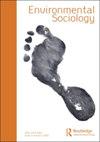对当地环境变化和生态习惯的认识
IF 2.4
Q3 ENVIRONMENTAL STUDIES
引用次数: 0
摘要
摘要研究表明,人们对环境变化的感知是生态支持行为和态度的有力预测因素,但人们对是什么导致一些人比其他人更能感知环境变化知之甚少。这项研究考虑了参与户外休闲活动是否会导致对当地环境的不同看法。我们考虑休闲活动如何形成更广泛的“生态习惯”,同时也考虑教育在构建观念和实践中的作用。我们使用环境变化感知的调查数据,并使用主成分分析和逻辑回归来探索生态习惯和休闲活动对环境感知的影响。结果表明,户外休闲实践塑造了对当地环境变化的感知,并提供了一个连续的生态习惯,从欣赏到低资源的户外休闲,与环境退化的各种感知相关。在预测休闲和环境感知之间的关系或解释休闲和环境认知之间的关联方面,教育是一个有限的因素。本文章由计算机程序翻译,如有差异,请以英文原文为准。
Perceptions of local environment change and ecological habitus
ABSTRACT Research shows that people’s perceptions of environmental change are strong predictors of ecologically supportive behaviours and attitudes, but less is known about what causes some people to perceive environmental change more than others. This study considers whether participation in outdoor leisure activities accounts for different perceptions of the local environment. We consider how leisure activities form a broader ‘ecological habitus’ while also considering the role that education has in structuring perceptions and practice. We use survey data on perceptions of environmental change and use Principal Component Analysis and logistic regression to explore ecological habitus and the effect of leisure activities on environmental perceptions. Results show that outdoor leisure practices shape perceptions of local environment change and offer a continuum of ecological habitus ranging from appreciative to low resource outdoor leisure associated with varied perceptions of environment degradation. Education is a limited factor in predicting perceptions or explaining associations between leisure and environmental perceptions.
求助全文
通过发布文献求助,成功后即可免费获取论文全文。
去求助
来源期刊

Environmental Sociology
ENVIRONMENTAL STUDIES-
CiteScore
4.60
自引率
12.00%
发文量
34
期刊介绍:
Environmental Sociology is dedicated to applying and advancing the sociological imagination in relation to a wide variety of environmental challenges, controversies and issues, at every level from the global to local, from ‘world culture’ to diverse local perspectives. As an international, peer-reviewed scholarly journal, Environmental Sociology aims to stretch the conceptual and theoretical boundaries of both environmental and mainstream sociology, to highlight the relevance of sociological research for environmental policy and management, to disseminate the results of sociological research, and to engage in productive dialogue and debate with other disciplines in the social, natural and ecological sciences. Contributions may utilize a variety of theoretical orientations including, but not restricted to: critical theory, cultural sociology, ecofeminism, ecological modernization, environmental justice, organizational sociology, political ecology, political economy, post-colonial studies, risk theory, social psychology, science and technology studies, globalization, world-systems analysis, and so on. Cross- and transdisciplinary contributions are welcome where they demonstrate a novel attempt to understand social-ecological relationships in a manner that engages with the core concerns of sociology in social relationships, institutions, practices and processes. All methodological approaches in the environmental social sciences – qualitative, quantitative, integrative, spatial, policy analysis, etc. – are welcomed. Environmental Sociology welcomes high-quality submissions from scholars around the world.
 求助内容:
求助内容: 应助结果提醒方式:
应助结果提醒方式:


